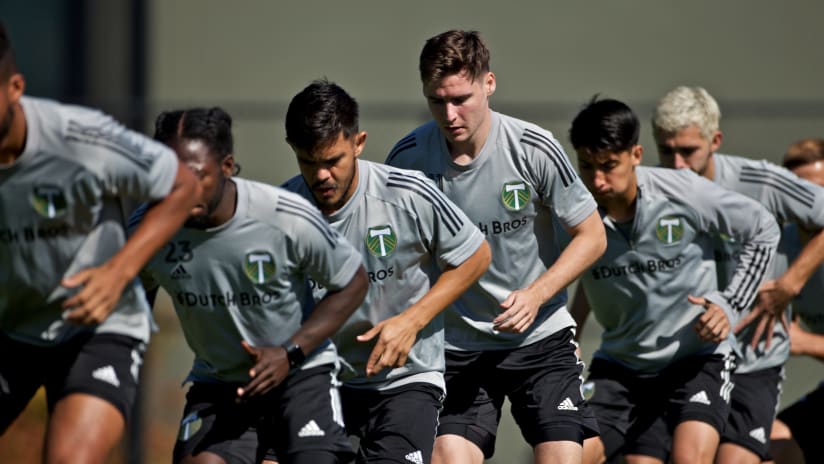Over the lifespan of this article – from the moment it goes live on Wednesday morning to shortly before the Portland Timbers leave San Jose, California – the Timbers will have fit two, three or four days into one. And within Major League Soccer, they won't be alone. As a precaution during the COVID-19 pandemic, teams traveling for games will fly, rest, play and fly out on the same day. In pre-COVID times, depending on the length of the trip, those tasks would cover as many as four days.
"It's going to be new," Portland head coach Giovanni Savarese conceded, speaking the day before his team left to face the San Jose Earthquakes (7:30pm PT, FOX 12 PLUS (KPDX)). "Traveling like this, in the morning getting there, doing things that we have to do in the hotel, then going to the stadium, play and come back, it's not usual. [The routine] definitely is something that we have to get used to …"
Portland also have road games on September 6 in Seattle and on September 13 at Los Angeles FC. For the Seattle trip, same-day travel is not completely unheard of. For the immediate future, though, "not completely unheard of" will be the norm. Though there's hope COVID-19's impact in the United States will abate, Major League Soccer must plan for the indefinite now.
"It's strange, right?" Timbers midfielder Cristhian Paredes asked rhetorically. "It's the first time I'm doing this, traveling the same day as the game. I think it's going to be a little different. You have to consider things like less time to rest, having the right balance in your diet, but most importantly, trying to do well in the game."
That, of course, is the point of playing the games. While there are many reasons why the Timbers could see themselves at a disadvantage on Wednesday – from the strange travel situation to the short rest; to San Jose's 25 days between games to the demands of the the Earthquakes' man-marking defense; to the downturn in form Portland suffered during Sunday's loss to Seattle Sounders FC – being aggravated by the negatives misses a larger, often unstated point.
Part of the point of a season is to test teams against a wide array of challenges. The quality of opponents is the most obvious of those challenges, but it's not the only one. The changes in environment and climate that come with travel is part of the picture. So are changes in form, as are rest periods where one team may be fresher than another. Beyond the gate receipts teams get from home games, large schedules are about tackling variance with sample size. It doesn't always even out, but it is implied: Individual games will come with individual challenges, and there's no guarantee each team will face their challenges in equal numbers.
"If you think positively, sometimes when you drive, you drive an hour-and-a-half in traffic to get to practice, and you perform anyway," Savarese said, contextualizing Wednesday morning's flight to San Jose. "It's all mental. We have to make sure that we are able to think positively, and whatever is going to be tomorrow, this travel is going to have to be done the best possible way. This is the new norm."
Under the old norms for shorter road trips, teams would travel one or two days before. More often than not it was one, with early or late flights determining whether you'd have a training session in that market. Sometimes, day-of travel happened, be it to or from the game, but when kickoffs were late, teams would usually stay a final night on the road. The typical off day players get after games is also, sometimes, a day of travel.
On Wednesday, the Timbers' traveling party will leave in the morning, even though kickoff in San Jose isn't until 7:30 p.m. Pacific. During the day, the athletic training staff will be able to help players work through the effects of travel. Meals will be had. Across the league, some teams will likely have a final film session before departing for the field, and departing the hotel for good. Once the game is over, it's straight to the airport. In San Jose, that's right across the street from the field.
"For me, [it's the] first time flying somewhere for a game while I'm here in Portland," striker Jaroslaw Niezgoda said. His MLS debut came in the Timbers' MLS is Back Tournament opener in Orlando, after Portland had already spent a week on the ground.
"I didn't fly to other cities, to other states," he explained. "Now it will be the first time, the same day. We'll see. It's a short flight. It shouldn't be a problem for us. We have a lot of time to rest after flying. It should be OK."
To the extent it's not OK, it will be for every team. Whether the new travel conditions mean tougher road games – or easier, or no difference at all – every team lives in this world, for now. Amid COVID-19's strange, improvised world, the reality of sports' seasons remains the same. You're faced with challenges. You try to overcome them.












